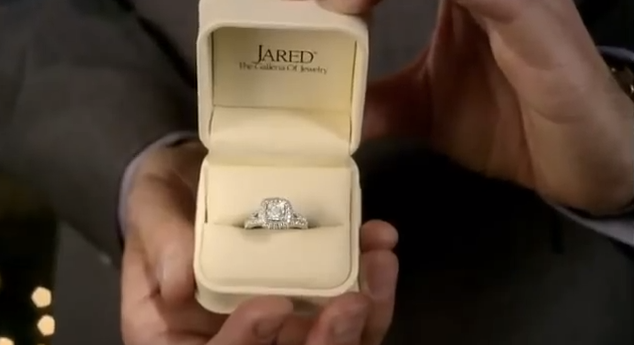In the ubiquitous television commercials for Jared the Galleria of Jewelry, women erupt with joy and gratitude whenever they come into contact with one of the company’s diamond rings. The rewards are less sparkling for the women who actually sell Jared’s wares at retail outlets across America, according to a class-action lawsuit filed today against Sterling Jewelers, which owns 1,400 jewelry stores across the United States, including the mammoth chains Jared and Kay Jewelers. The suit alleges that Sterling has systematically discriminated against female employees by paying them less than men, denying them promotions, and in some cases failing to appropriately respond to complaints of persistent sexual harassment. As one former Sterling saleswoman told the New York Times, she thought she was working in “the business of romance” but later discovered that it was just another “old boys’ club.”
In the complaint, 16 current or former Sterling employees share similar stories: Though many women had more experience and better sales records than the men they worked with, they were paid less for the same positions at the same stores at the same times, they allege. One complainant, Gloria Pagan, a sales associate in Saint Peters, Mo., says that she made just $8.50 an hour to a similarly situated male associate’s $11.50. Kelly Contreras, who worked at Sterling stores in Wisconsin and Minnesota, says that she was paid $35,000 a year for her job as a store manager while her husband, also a store manager, was paid an annual salary of $55,000—despite the fact that they had a similar level of experience and Contreras repeatedly won the company’s highest awards for excelling at her position.
Judy Reed, who was hired as an assistant manager of a Jared store in Appleton, Wis., says that, though she had 30 years of industry experience, she was routinely denied the opportunity to apply for promotions; managerial positions were instead handed to men with just two or three years on the job. And Lisa McConnell, who worked as an assistant manager at a Kay store in Elkhart, Ind., says that her male manager told her plainly that her $12 per hour pay rate was $2 to $3 less than the hourly rate paid to male assistant managers at the company, despite the fact that McConnell held one of the most impressive sales records at Sterling stores in her area. McConnell says that she and other female employees at the store were later sexually harassed by one of these high-earning male assistant managers. She alleges that she was fired shortly after she reported the harassment to supervisors.
Sterling spokesman David Bouffard has responded by saying that these women’s claims of pay discrimination are without merit, that the claims of sexual harassment were investigated, and that employees who were found to have violated the company’s discrimination policy were disciplined. “Fairness, equal opportunity and respect for our female employees—and all employees,” he told the New York Times, “is central to who we are.”
The women of Sterling have been fighting to be compensated equally since at least 2005, in complaints filed with their supervisors, with Sterling’s in-house dispute resolution program, with New Jersey’s Department of Law and Public Safety (which found probable cause that Sterling had discriminated against women), and with the Equal Employment Opportunity Commission. In 2008, the EEOC filed suit against Sterling on behalf of the company’s 44,000 female employees, alleging that women had been denied promotional opportunities and paid less for equal work companywide. A federal judge threw out the EEOC’s suit this month, claiming that the commission hadn’t conducted a thorough enough inquiry of the company to justify a class claim, as its investigation had only involved a handful of Sterling stores.
The current class-action suit will be decided privately in arbitration, thanks to a clause in Sterling’s employment contract that’s been in place since 1998 to keep employee disputes out of the courts. But no matter how the arbitration goes, the allegations of pay discrimination and persistent sexual harassment in the suit provide a compelling reason for men across America to avoid showing affection with jewelry from Jared and Kay. And also a compelling reason for employers to evolve past their “unconscious” sexism in hiring and promotion, which can lead to some very messy and highly public court battles.
